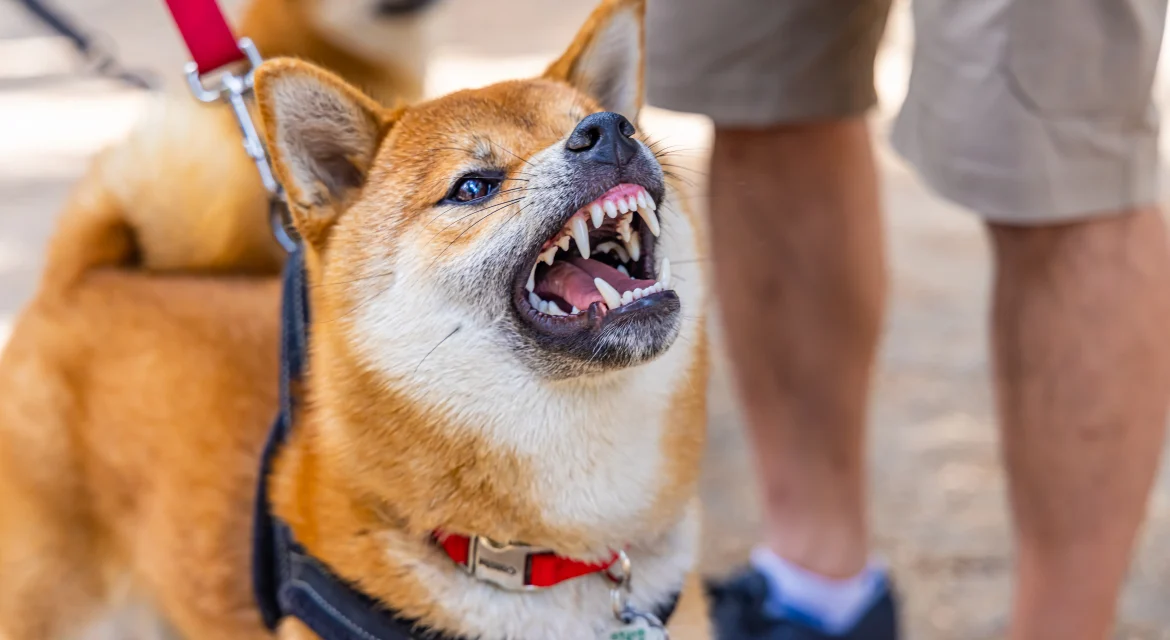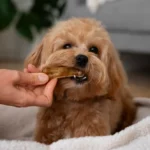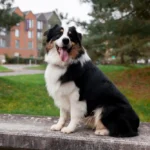If you’re a proud Shiba Inu dog owner, you’ve probably already figured out that raising one is not for the faint of heart. As adorable as they look, Shibas are known for their stubborn streaks, dramatic tantrums, and unpredictable moods. From ignoring commands like they’ve never heard them before to sudden outbursts of aggression or nonstop barking, it can feel like your once-cute companion has turned into a four-legged mystery.
It’s not that you’re doing something wrong Shibas are simply wired differently. Their intelligence and independence require a unique approach. These issues can be managed with the right approach, consistency, and a bit of insider know-how. Let’s break down the most common Shiba Inu behavior problems and how to handle them without losing your cool.
Top 8 Shiba Inu Dog Breed Behavior Problems
Aggression and Aggressive Issue
Shiba Inus are famously independent, often marching to the beat of their own drum. While this strong-willed nature is part of their charm, it can also lead to dominant or territorial behavior if not addressed early. Without proper socialization from a young age, some Shibas may become reactive or show aggressive behavior especially toward unfamiliar people or other dogs.
Their instinct to protect their space and assert control can quickly escalate if they aren’t taught how to interact respectfully and confidently in different situations. With the right guidance, though, these intelligent dogs can learn to channel their bold personalities in positive, well-mannered ways.
The Shiba Scream
The ignominious “ Shiba scream ” is a loud, high-pitched, and frequently theatrical communication that can catch anyone off guard. This dramatic outburst generally happens when a Shiba Inu feels worried, spooked, or just doesn’t want to be handled or restrained. While it might sound alarming like they’re being hurt. It’s not a sign of aggression. Instead, it’s their intense way of expressing discomfort or strong protest. For new Shiba owners, it can be surprising, but it’s just another quirk of this bold and expressive breed.
Aloof with Strangers
The Shiba Inu is naturally aloof around strangers, often coming across as reserved or uninterested in new people. This distant demeanor is rooted in their strong independent streak and shouldn’t be mistaken for dog aggression. Rather than seeking attention or affection from everyone they meet, Shibas tend to observe from a distance, choosing when and with whom they engage.
While some may see this as standoffish, it’s simply part of their dignified and self-assured personality, a trait that makes them unique among companion breeds. With patience and respect for their boundaries, they can form deep, loyal bonds over time.
Stubbornness and Training Challenges
Shiba Inus are incredibly smart, but their stubborn streak can make training feel like a battle of wills. They’re known to ignore commands if they don’t see what’s in it for them, choosing independence over obedience. This doesn’t mean they can’t be trained. it just takes the right approach. Consistency, patience, and plenty of positive reinforcement are key. Shibas respond best to short, fun, and reward-based training sessions that keep them mentally stimulated. Earning their trust and respect turns training into teamwork, rather than a tug-of-war.
Escaping and Roaming
Shiba Inus have rightfully earned their character as escape artists. With their nimble bodies and determined minds, they’ll find creative ways to climb over, dig under, or squeeze through fences especially if something catches their eye. Their strong prey drive makes them lightning-fast when chasing after squirrels, birds, or anything that moves. Combine that with their fierce independence, and a moment off-leash or a gate left ajar can quickly become a full-blown chase. For this reason, secure fencing and leash training are absolute musts for keeping your adventurous Shiba safe and sound.
Destructive Behaviour
Shiba Inus require a lot of physical and mental stimulation to keep happy and healthy. Without enough exercise or enriching activities, they can quickly become bored and a bored Shiba is a recipe for chaos. When left alone too long or under-stimulated, they often turn to destructive behaviors as a way to release their pent-up energy.
This can include chewing furniture, digging up the yard, tearing cushions, or shredding anything they can get their paws on. Keeping a Shiba mentally engaged with puzzle toys, training games, and regular outdoor adventures is key to preventing this kind of mischief.
Not always a family dog
Shiba Inus are known for thShiba Inus are recognised for their brave and independent nature, which might make them a tough fit for some households. While they can form deep bonds and show loyalty and affection to their owners, they’re not always patient or tolerant, especially when it comes to rough handling or the unpredictable energy of small children.
Their dislike of being grabbed, poked, or overly fussed with can lead to defensive reactions. As a result, they thrive in households with older children who understand how to respect a dog’s space and boundaries. With the right environment and guidance, however, a Shiba can be a wonderful, devoted companion.
High Prey Drive
Shiba Inus have a strong, instinctive prey drive that’s hardwired into their DNA. Originally bred for hunting, they’re quick to react to movement whether it’s a squirrel darting across the yard, a bird taking flight, or even a smaller dog or cat nearby. This chase instinct can kick in suddenly and without warning, making off-leash time risky unless in a secure, enclosed area. Their sharp eyes and lightning-fast reflexes mean you often won’t get a second chance to call them back once something catches their attention. For safety and control, it’s essential to keep them leashed and work on strong recall commands early on.
When Do Shiba Inu Dogs Start Showing Behavior Problems?
Shiba Inu dogs can begin to show behavioral issues as early as 3 to 6 months old, especially if they’re not properly trained or socialized during this critical stage. Their bold, independent personality often leads to stubbornness, selective hearing, and even signs of aggression issues particularly as they approach adolescence.
Without clear structure and guidance, these behaviors can become more difficult to manage over time. However, with consistent training, early socialization, and plenty of mental and physical stimulation, a Shiba can grow into a loyal and well-mannered companion. The secret lies in being patient, persistent, and always one step ahead of their sharp, clever minds.
Are shiba inu naturally aggressive?
Shiba Inus aren’t naturally aggressive, but their spirited and independent nature can make them challenging without proper guidance. When not socialized early or consistently trained, their strong will can turn into defiance or dominance.
They may show aggression due to fear, anxiety, possessiveness over food or toys, or even poor breeding. Without clear boundaries and structure, behaviors like guarding, snapping, or resisting commands can surface. While not inherently aggressive, Shibas need firm, positive training and early socialization to ensure their confidence doesn’t evolve into problematic behavior.
How to handle Shiba Inu dog behaviour problem?
Handling behavior problems in Shiba Inus starts with understanding their unique personality independent, intelligent, and sometimes stubborn. The key is to establish consistent rules early on and stick to them.
Use positive reinforcement like treats, praise, or play to reward good behavior, as harsh discipline can make them more defiant. Socializing them from a young age with different people, animals, and environments helps reduce fear and reactivity.
Since Shibas are highly energetic and curious, daily physical exercise and lots of mental stimulation are essential to prevent boredom and destructive behavior. With patience, structure, and a bit of creativity, even the most strong-willed Shiba can become a loyal and well-mannered companion.
What are the best activities to reduce Shibas behavioral problems?
Here’s a clear, engaging list of the best exercises and activities to reduce Shiba Inu breed behavior problems:
1. Daily Walks (30–60 minutes)
Structured daily walks are essential for releasing pent-up energy and preventing restlessness. Shibas thrive on routine, and regular walks not only provide physical exercise but also give them the chance to explore, sniff, and mentally unwind. A calm Shiba indoors often starts with a well-walked one outdoors.
2. Jogging or Running
Once your Shiba has mastered leash manners, they can be excellent jogging partners. Their high energy levels and endurance make them ideal for short to moderate runs. This activity helps burn excess energy quickly, which reduces hyperactive or destructive behaviors at home.
click here to read more about outdoor exercises for dog to kepp they socialise.
3. Fetch or Ball Chase in a Fenced Yard
Shibas have a strong prey drive and love to chase. Fetch and ball games give them a safe outlet to express this instinct. A securely fenced yard is important, never trust a Shiba off-leash in an open space, as they may bolt after something interesting.
4. Puzzle Toys and Treat Dispensers
Mental stimulation is just as important as physical activity. Puzzle toys, snuffle mats, and treat-dispensing balls challenge their problem-solving skills and keep their minds occupied. These are great for solo play, especially when you’re busy or away.
5. Hide-and-Seek (with treats or toys)
Hide treats or toys around the house or yard and encourage your Shiba to sniff them out. This engages their sense of smell and satisfies their natural curiosity, all while providing a fun, interactive bonding experience.
6. Obedience Training Sessions
Regular short training sessions keep their mind sharp and reinforce good behavior. Using positive reinforcement Shibas love learning when there’s a reward involved. Training also builds trust and helps you establish leadership in a respectful way.
7. Agility or Obstacle Courses
Setting up a simple agility course with jumps, tunnels, and weave poles is a fantastic way to combine physical and mental stimulation. Shibas are agile and quick learners, and they enjoy the challenge and variety this provides.
8. Socialization with Other Dogs
Regular, supervised playdates with other dogs especially from a young age help reduce dog-to-dog aggression and teach appropriate social behavior. Choose calm, well-mannered dogs and monitor the interaction closely.
9. Calm Cuddle Time or Massage
Despite their independent nature, Shiba Inus still benefit from gentle physical affection on their terms. Calm cuddle sessions, especially after exercise or before bedtime, can help soothe anxiety and reinforce a sense of safety. Light massages along their back, shoulders, or behind the ears not only relax tense muscles but also deepen your bond.
Conclusion
Shiba Inus are a unique and spirited breed, fiercely intelligent, fiercely independent, and undeniably charming. While their strong personalities can lead to behavior challenges such as stubbornness, aloofness, aggression, or escape attempts, these issues are not impossible to manage. With proper training, consistent boundaries, early socialization, and plenty of mental and physical stimulation, most Shiba behavior problems can be prevented or corrected over time.
Owning a Shiba Inu isn’t for everyone; it requires patience, commitment, and an understanding of their distinct personality traits. But for those willing to invest in the journey, the reward is a loyal, quirky, and deeply entertaining companion. Remember: the key isn’t to suppress their nature but to work with it building mutual trust, respect, and a bond that lasts a lifetime.




